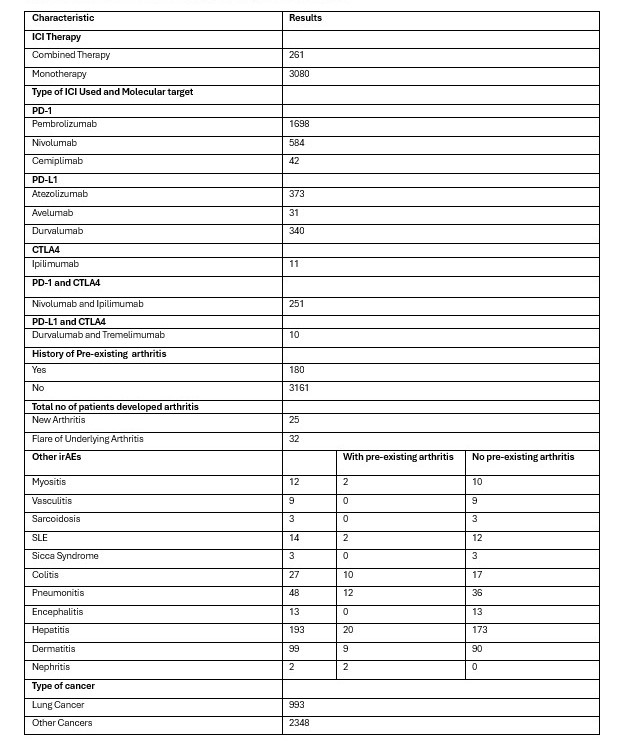Session Information
Date: Monday, October 27, 2025
Title: (1088–1122) Immunological Complications of Medical Therapy Poster
Session Type: Poster Session B
Session Time: 10:30AM-12:30PM
Background/Purpose: Immune checkpoint inhibitors (ICIs) have revolutionized cancer therapy by enhancing the immune system’s ability to fight cancer. However, their use is associated with immune-related adverse events (irAEs), including rheumatologic complications such as inflammatory arthritis. This study aims to evaluate the incidence and predictors of new-onset inflammatory arthritis and other irAEs in cancer patients treated with ICIs, with a focus on the impact of PD-1 versus PD-L1 blockade and the influence of pre-existing arthritis.
Methods: This study retrospectively analyzed electronic medical records of 3,341 patients treated with ICIs at Upstate University Hospital from 2011 to 2024. It screened for rheumatic immune-related inflammatory arthritis and systemic irAEs. Statistical analysis used chi-square or Fisher’s exact test with GraphPad V10 software, considering a two-tailed p-value < 0.05 as significant.
Results: Table 1 outlines characteristics of 3,341 ICI-treated patients. Pembrolizumab (51% of patients) and nivolumab were most common (17.5%). The vast majority of patients were on monotherapy (92.2%). 5.4% of patients had a pre-existing history of inflammatory arthritis.Table 2 outlines the prevalence of arthritis in ICI-treated patients. PD-1 inhibitors were associated with a higher incidence of inflammatory arthritis as compared to PD-L1 inhibitors (p < 0.001). Pembrolizumab was associated with a higher incidence of arthritis, affecting 19.05% of patients, compared to nivolumab, which affected 1.37% of patients (p < 0.001). Lung cancer patients had highest incidence of inflammatory arthritis (2.62%) compared to patients with other types of cancer (1.32%, p = 0.0081).Furthermore, the data shows a highly significant association between a pre-existing history of arthritis and the development of inflammatory arthritis during treatment (p < 0.0001), with 17.8% of patients with prior arthritis developing inflammatory arthritis compared to 0.8% of those without such a history. Table 3 outlines the association between pre-existing arthritis and the development of total irAEs is highly significant (p < 0.0001), with 49.4 % of patients with prior arthritis developing irAEs compared to 14.2% of those without such prior history. Regarding subtypes of irAEs, conditions such as Colitis, Pneumonitis, Hepatitis, and Nephritis show highly significant associations (p < 0.00016), whereas other subtypes like vasculitis, sarcoidosis, sicca syndrome, encephalitis, SLE, Dermatitis, and Myositis were not statistical significance in patients with a pre-existing history of arthritis compared to those without (p >0.05).
Conclusion: PD-1 inhibitors are markedly more prone to induce inflammatory arthritis than PD-L1 inhibitors. Amongst PD-1 inhibitors, pembrolizumab is associated with a higher incidence of inflammatory arthritis as compared to nivolumab. Lung cancer patients have a higher incidence of inflammatory arthritis compared to patients with other types of cancer. Moreover, prior history of arthritis overall predisposes to all types of irAEs. Prospective studies are warranted to validate these findings.
 Table 1: Baseline and Clinical characteristics of the patient on ICI. (Nf3,341)
Table 1: Baseline and Clinical characteristics of the patient on ICI. (Nf3,341)
.jpg) Table No.2 . Comparing the incidence of inflammatory arthritis among different ICIs, various cancer types in patients with a pre-existing history of arthritis versus those without
Table No.2 . Comparing the incidence of inflammatory arthritis among different ICIs, various cancer types in patients with a pre-existing history of arthritis versus those without
.jpg) Table No.3: Comparing the incidence of various irAEs in patients with a pre-existing history of arthritis versus those without
Table No.3: Comparing the incidence of various irAEs in patients with a pre-existing history of arthritis versus those without
To cite this abstract in AMA style:
Kc B, Sharma Subedi A, Walsh S, Memon A, Perl A. Prior history of arthritis and PD-1 over PD-L1 blockade predispose to immune-related adverse events in cancer patients treated with immune checkpoint inhibitors [abstract]. Arthritis Rheumatol. 2025; 77 (suppl 9). https://acrabstracts.org/abstract/prior-history-of-arthritis-and-pd-1-over-pd-l1-blockade-predispose-to-immune-related-adverse-events-in-cancer-patients-treated-with-immune-checkpoint-inhibitors/. Accessed .« Back to ACR Convergence 2025
ACR Meeting Abstracts - https://acrabstracts.org/abstract/prior-history-of-arthritis-and-pd-1-over-pd-l1-blockade-predispose-to-immune-related-adverse-events-in-cancer-patients-treated-with-immune-checkpoint-inhibitors/
